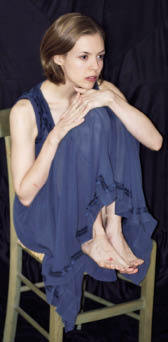In the Blood
Finborough, until 4 September
Zelda
Leicester Square
Those who oppose state-funded theatre in Britain sometimes imagine that America, with its far smaller subsidised sector, is spared the sort of pious, jokeless, grind-yer-nose-in-it plays which our handout theatres use to punish audiences for the sin of being affluent. But American theatre turns out to be richly contaminated with underclass miserablism too. Suzan-Lori Parks is a supreme purveyor of the goods and, like many second-rate talents from minority backgrounds, she’s been given more prizes than Chekhov. She’s won the Pulitzer. She’s been nominated for a Tony. She occupies the Master Writer Chair at a New York theatre and she’s won the MacArthur ‘Genius’ Award, a prize which is presented every year, apparently, irrespective of the quality of the available talent. Any old genius will do.
Her latest wrist-opener, In the Blood, seems an incongruous choice for the mighty Finborough Theatre, a self-financing house noted for its adventurous choice of fine new plays. The script follows the sufferings of a feckless nincompoop called Hester, who manages her life with spectacular ineptitude. Unmarried, unemployed, overdrawn and homeless, Hester is struggling to raise five fatherless children on her own. She can’t afford to eat and she makes up for it by bellowing a lot. She and the kids live outdoors underneath some towels. Every so often she rents out her charms to men but even here she’s failed to grasp the basics. She performs sex without arranging a price in advance or collecting the cash afterwards. This is not the way to reach the top of the profession, I’m afraid. Everyone exploits her, the doctor, her best friend, the social worker appointed to her case. Desperation eventually drives her to a senseless act of violence.
Though the play won plaudits in America this production is seriously underfunded. Six actors perform 11 roles, including Hester’s brood of squealing little bratlets. A fine actor, Richard Pepple, has to play a sombre evangelical pastor and, after a quick change, a two-year-old in a rompersuit. It’s curious that the play allows no scope for redemption or hope. Instead of rousing us to acts of altruistic munificence Ms Parks seems to be preaching apathy. The poor are so hopelessly debased that we should leave them to it. Let Hester fester. The Finborough, I’m delighted to report, took a different view and the ushers held a collection at the end. But as I threw my two quid into the bucket I noticed that the money wasn’t for the homeless but for the theatre’s new air-conditioning system. What a strange moral twist. We watched a play about grinding poverty and then donated generously to improve our own comforts.
Another American writer, Kelly Burke, has created a one-woman show about Zelda Fitzgerald. It opens with the wretched alcoholic dumped in a Midwest sanatorium writing indignant letters to her husband. Scott was busy in Hollywood writing Shirley Temple movies and steadily killing himself with booze but he was always glad to get letters from the missus. He dropped them, unaltered, into his fiction. There are large chunks of Tender is the Night which are attributed to the wrong Fitzgerald. Zelda was unstable and overfond of the gin bottle but she didn’t deserve to be cooped up in a maximum-security health clinic and subjected to the weird pseudo-scientific experiments of her doctors. The suggestion is that Scott colluded in what was effectively a medical incarceration.
The story has peculiar parallels with Vivien Haigh-Wood, T.S. Eliot’s first wife, who was diagnosed with ‘hysteria’ (for which her doctors prescribed alcohol) and shunted off to an asylum where she pined away and died. These days Viv and Zelda would have met on the internet, started a website and a support group, published their memoirs, turned their life stories into inspirational films and created a spin-off TV talk show that celebrated the indomitability of the female spirit. But Zelda’s only weapon was her pen, and even that meagre comfort was confiscated by the doctors in pursuit of her ‘wellbeing’.
This is a short, vivid and fascinating monologue performed with zestful brilliance by Kelly Burke who, like her subject, is a great American beauty. The script moves a little too quickly over the terrain. I could have done with more about New York and Paris, about Hemingway, Joyce and Gertrude Stein and the other literary stars Zelda encountered. Thrifty to the point of minimalism, the show doesn’t even allow itself a jazz soundtrack. Instead Burke conjures the roaring Twenties with nothing but her svelte figure and the odd brilliant soundbite. Ensconced in boozy splendour in the south of France, Zelda describes the Fitzgerald lifestyle with an inventory. ‘We had a child, a nanny, 13 corkscrews and one toothbrush.’ The show closed last weekend but it’s bound to be revived soon, ideally at a literary festival.







Comments